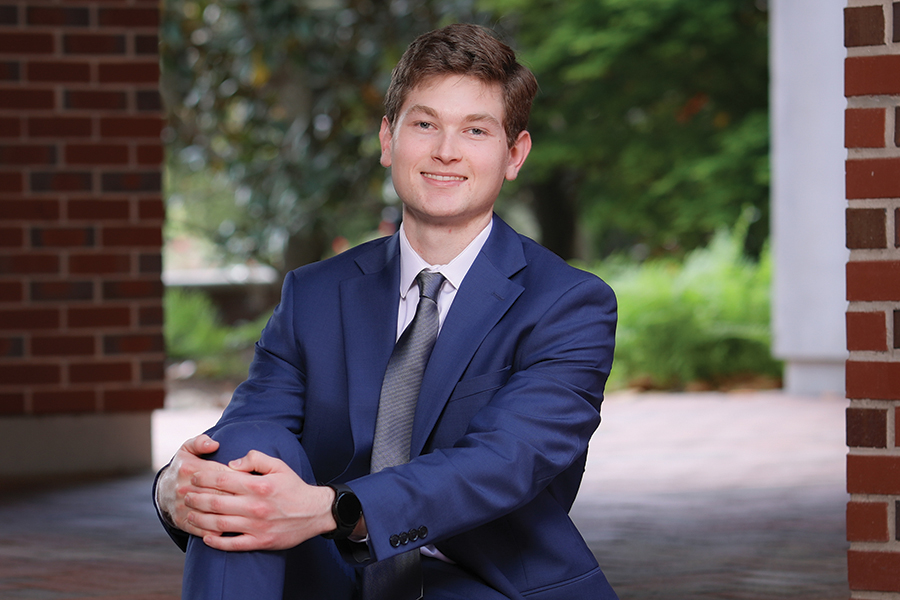Scout’s Honor
Biology student, medical response unit volunteer, and Eagle Scout Connor Krassel uses interdisciplinary skills to serve his community

Connor Krassel is busy. When the Florida State University biological science major isn’t attending a lecture or researching in a laboratory, he can be found zipping around the Tallahassee campus in a golf cart, coming to students’ aid as part of the FSU Medical Response Unit. You might also find Krassel drawing on the (whiteboard) walls in FSU’s Academic Center for Excellence, tutoring students in general chemistry, or studying for his medical school admission test.
It may seem like a chaotic constellation of activities; however, Krassel is acutely aware of common threads connecting his past experiences, current choices, and future plans for a career in medicine — his interest is in cardiology.
“Coming to FSU as a freshman, I wanted to get involved in the many opportunities available,” said Krassel, who is also minoring in chemistry. “I joined the Pre-Medical American Medical Student Association and learned about MRU through that group. I thought joining MRU would be a great chance to also find community.”
Krassel is among more than 100 trained MRU student volunteers who function as a basic life support quick response unit covering on-campus emergencies as well as activities, student-organized events and more. In MRU, he found a group whose members share his combined passion for helping people and interests in biology and medicine.
“Joining the MRU allowed me to accrue clinical experience while finding a new community,” Krassel said. “It’s rewarding to give back to FSU through combining my interdisciplinary science education with service.”
Krassel has been seeking, and succeeding in, community since childhood. At age 7, he and three cousins joined the Cub Scouts where he developed skills and interests that set the foundation for his study and who he is striving to become.
“When I earned merit badges, I learned basic medical techniques and vital survival skills needed in emergencies,” said Krassel, who progressed through the ranks and eventually became an Eagle Scout. “I realized I could use these small aspects of medicine to aid my community, which helped me realize I wanted to pursue a medical career.”
He’s also found interconnection among his areas of study — topics within biology intertwine with components of chemistry in the study of properties and reactions of matter. Through time in the classroom and with MRU, Krassel realized interdisciplinarity is integral to the successful practice of medicine.
“All my coursework relates back to my medical experiences, which tie into my desire to attend medical school to become a cardiologist. Understanding concepts in biology and chemistry is especially important because first-responders and medical professionals need to know how molecules function within the context of medicine and how those affect a person in crisis.”
— Connor Krassel
“All my coursework relates back to my medical experiences, which tie into my desire to attend medical school to become a cardiologist,” Krassel said. “Understanding concepts in biology and chemistry is especially important because first-responders and medical professionals need to know how molecules function within the context of medicine and how those affect a person in crisis.”
Seeking additional connections and community, Krassel joined FSU’s Undergraduate Research Opportunity Program, which allows first and second-year undergraduate students to get involved in research and connect with a research mentor on campus.
After exploring several options, Krassel interviewed for a position in the exercise physiology lab of Robert Hickner, the Linda Grizzard Owens Professor in the FSU College of Education and Health and Human Sciences. There, he worked on a UROP project investigating how creatine supplementation could benefit the cognitive health of elderly adults, with the aim of better understanding mechanisms that contribute to neurological ailments like dementia and Alzheimer’s disease.
“Creatine, which is created naturally in the brain and ingested through meat and other products, allows ATP, our body’s energy source, to be used more effectively,” Krassel explained. “For example, some athletes use creatine to supplement sprinting, weightlifting or other activities. The project examined how the health of an organ utilizing a lot of ATP, like the brain, is influenced by higher levels of creatine with a goal of reducing the progression or severity of neurological symptoms.”
This work inspired another opportunity directly aligned with Krassel’s cardiology interest. He and a classmate were awarded an FSU IDEA grant, which provides up to $4,000 of financial support for undergraduates to pursue research, creative projects, or the development or continuation of new projects under faculty mentorship, to undertake a research project in Summer 2023. Krassel, who received an additional stipend to continue the work this summer, researches how concentrations of free radicals — atoms, molecules, or ions with at least one unpaired valence electron — influence cardiovascular disease risk factors.
“Connor is very involved in our research and a crucial member of our team,” Hickner said. “He has been successful, outstanding actually, in the UROP program and IDEA grant program that have taught him clinical study conduct and novel methods we use, such as microdialysis, to study local metabolism and blood flow.”
As he takes the next steps in his career preparation, Krassel is grateful for the opportunities and options he’s had at FSU.
“It’s a community beyond communities,” he said. “FSU seemed like somewhere I could find my social group and also find new areas to become passionate about. I want to keep experiencing as much as I can.”
